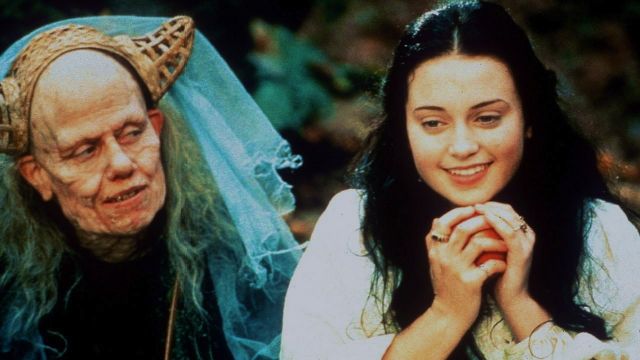Snow White: A Tale of Terror (1997) 
“The fairytale is over.”

Director: Michael Cohn
Cast: Sigourney Weaver, Sam Neill, Gil Bellows
Synopsis: Michael Cohn’s take on the Snow White fairy tale eschews the cuteness of Disney’s vision for an altogether darker retelling
Michael Cohn’s take on the Snow White fairy tale eschews the cuteness of Disney’s vision for an altogether darker retelling in this 1997 version which failed to make it into theatres in the States and did little business at the box office elsewhere. Writers Thomas E. Szollosi and Deborah Serra take the Grimm Brothers’ version as their source material, but fail to inject any depth into familiar characters who necessarily require fleshing out from their short story origins.
We first meet Snow White, or Lilliana as she is known here, as a child (Taryn Davis) — complete with irritating broad American accent. Her mother died giving birth to her, and her father is about to remarry. His bride to be is Claudia (Sigourney Weaver), a woman with no children of her own, and Lilli is immediately resentful of her hijacking of her father’s attention and her attempt to replace her mother. Claudia at least tries to connect with her new husband’s daughter, but when it becomes apparent that Lilli will resist any attempts at friendship she quickly gives up, apparently prepared to tolerate a frosty stand-off.
Later, as Lilli stands on the cusp of womanhood, Claudia falls pregnant but she miscarries the baby and her simmering resentment of Lilli devolves into something much darker. She blames her step-daughter for the loss of her unborn son and instructs her mute brother Gustavo (Miroslav Taborsky) to kill Lilli and bring her the dead girl’s heart. However, Gustavo bungles the job, losing Lilli when she falls into a hole in the woods into which he has chased her, and he slaughters a pig instead, hoping his sister won’t realise the heart he brings her belongs not to her step-daughter but to the dead animal. Yeah, right, like that’s going to work. Claudia has this talking mirror hidden in her closet, and not only does it reflect her true soul, it also knows when someone’s trying to pull the wool over her eyes. So it’s not long before the hapless Gustavo is stabbing himself in the heart under Claudia’s malign influence.
Meanwhile, Lilli takes refuge in a derelict building in the forest which just happens to be the home of a group of gold miners who are neither dwarfish nor cute — well, one of them’s a dwarf but he’s definitely not cute. Their reactions to finding a teenage girl in their home are mixed; one wants to eat her, another wants to kill her, and a third wants to do rude things to her which he sets about doing until another of their number, Scar (Andrew Tiernan), pulls him off. Very slowly, their inherent mistrust of Lilli dissolves, even though each time Claudia uses her powers to kill Lilli it’s one of them that is knocked off. You’d think they might put two and two together, or at least come to the conclusion that Lilli’s something of a jinx, but apparently not…
On paper, Snow White: A Tale of Terror no doubt looked like a terrific idea. Fairy tales naturally lend themselves to dark and twisted interpretations. Snow White is a story filled with all the classic ingredients, and it’s always interesting to see a familiar story retold in a radical fashion. But the movie stubbornly refuses to take off even though it keeps sprinting down the runway with the veins in its neck bulging. The main problem is that we get the impression that the writers have mapped out the story as a check list of key plot points which must be visited in sequential order, which is absolutely correct. However, this seems to have been their sole objective, with little thought given to creating complex, believable characters.
Sigourney Weaver gives a typically professional performance as the evil Lady Claudia, but she’s sorely miscast in the part. Weaver has never looked as though she’s been beaten with an ugly stick, but she lacks the kind of near-unattainable beauty for which the part calls. After all, this is the fairy tale in which the Wicked Stepmother recites ‘Mirror, mirror on the wall..’ although Weaver isn’t called upon to do this here, and one can’t help wondering why the story is changed so radically from the Grimm version in this respect. Sam Neill plays Lilli’s father but is given little to do in a largely under-written part.
Paradoxically, it’s the departures from the Grimms’ story that provide both its strengths and weaknesses. The film’s reinterpretation of the dwarves into a gang of mercenary miners is an intriguing one, and could have been explored further, but its decision to abandon the ‘beauty’ strand in favour of the frankly bizarre undead son subplot turns out to be a badly misguided one.
(Reviewed 14th September 2013)
httpv://www.youtube.com/watch?v=KOlQ75fhWKE
